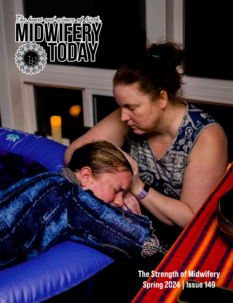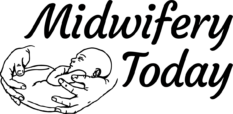
Photo by Michelle McClafferty—BetterBirthPartners.com
The Question of Homebirth
Editor’s note: This article first appeared in Midwifery Today, Issue 93, Spring 2010.
Subscribe to Midwifery Today Magazine
Since when do we need an expert to tell us where we are comfortable? Since when do we need an expert to tell us with whom we feel relaxed and open and able to poop or make love or birth a baby? Since when was there an animal that didn’t know how to protect itself—to flee or scratch and bite or growl when it isn’t comfortable? Or to protect its young—to hold it close and get it back if it is snatched away and avoid people and places that threaten the ease of living and feeding the newborn? We are an intelligent animal. We know more than we are letting on. We know more than we tell ourselves that we know. When we stop the voices and fear and noise all around us and echoing within us, we know most certainly if we are comfortable or not. Our bodies speak loud and clear. When we are touched or surrounded by people we know and love and feel loved by, we relax and smile and make babies and enjoy birthing them. If someone could check our blood pressure during these times, professionals would have a whole new world of data upon which to base their standard of care. But how rude! To interrupt a good meal or poop or climactic moment with our beloved or the infinitely sacred moment of a mother about to touch her fresh born. How wrong! Only to prove that we are expressing our greatest potential of well-being within our sacred moments of life and relationship.
I have a sister with “white coat hypertension.” Indeed, as long as someone who isn’t a doctor or nurse takes her blood pressure, it’s normal. She was 17 when the “condition” was discovered. Thirty years later as an intensive care nurse, nothing has changed. White coats make her blood pressure go sky high. We do know. We have a right to the knowing. We have only to overcome the fear of what it will look like when we say so. We have only to overcome the fear that our knowing, our powerful choice, may leave us empty-armed and brokenhearted. We have no better chance with anyone else’s knowing, no matter what they say. To use our instinct to trust another’s is to lose twice. No one can promise that we will not have empty arms and broken hearts. Most mothers and babies do live and we have every right to decide what we are going to live with.
There is no single right way to birth, but there is the way that is right for each mother. Left to her instincts, whether on an island or under a tree or in a taxi or a palace chamber, a woman who wishes to birth in her own home with her own people is deeply in touch with her instincts and she has every right to be supported or left alone.
When I wrote The Power of Women as a storybook, I was using my knowledge that a woman will read a fact once and a story over and over. The stories help her find and validate her own knowing. Sometimes a birth that lacks the divine will call forth a woman’s knowing stronger than a simple and sacred birth of a woman whose culture doesn’t do it any other way. I’ve seen more than one woman defy the surgeon’s knife and push her baby out on an operating table, determined to birth the way she wanted. Every one of those women went on to birth their next baby at home, with dim lights or moonlight, and eyes gazing into their miracle made flesh, lost in timeless bliss. Sometimes it takes being a part of something that is so wrong to find what is so right for us. I was one of those women. It takes a brave, strong woman to say no to others and yes to herself, but a 2-year-old can do it and so can we.
No one wants a better outcome for herself and her baby than the mother. Who do we think we are? Haven’t we worked with enough segments of the population and diverse cultures to know what happens to the vital signs and eyes and muscles of a woman in labor when strangers or professionals come in the room and scare her with “if you don’t,” and “what if,” and “what about your baby?” Can’t we see? Can’t we see the fear and panic turn into submission? Or maybe the submission started long ago and she begins her journey ready to be told what to do. A red carpet awaits her. But if she is one who wishes to keep to the quiet, private, familiar environment she calls home or to create a quiet, private nest for herself, she is expressing her instincts, like all the other healthy, wise, instinctual creatures sharing the planet with her. We know that birthing animals need privacy, quietness, dark, stillness, a sense of the familiar, their own nest and simple warmth, shelter, water and uninterrupted contact with their babies. Why shouldn’t we support a human animal in needing the same? Since when must the nest be sterile for the mother or young to survive? Zoologists know that wild animals become less fertile and less successful in birthing a live offspring and less likely to bond and protect the one(s) that do survive once they are taken out of their natural environment. We are lucky, blessed, if there are women who have strong instincts to stay home. As socially developed right-fighters, we can see that it would be unjust to force a woman to stay home or breastfeed or mate against her will. It is equally unjust to force her to leave her home. It is immoral to frighten her to do so. It is no secret; she knows it in her bones.
Women are team players. They are storytellers. They are nurturers and filled with creative forces when they are fertile, pregnant or birthing. Millions of years of biology are on their side to “bring forth.” Nothing can stop the power behind that force, not even the woman herself. She will step livelier, shake her feathers, dance a jig, speak in song, find a mate, believe in the impossible—and rightly so. She is the living essence of the future. She is a holy woman and there is intelligence at work in her. It is sacred energy.
What happens if a woman follows her instinct and births where she wants to and with whom she wishes? What if her choice is against the modern current of standard practice? Well, if it all goes well—and believe me, it usually does; millions of years of biology don’t miss often—I will tell you what I have seen. She roars when she sings. She tells her story with pride. She believes she can do anything. She encourages other women to follow their instincts. She breastfeeds longer. She tells happier stories and listens with a compassionate tear in her eye to the sad ones. She can focus on another’s story because she isn’t busy reliving her own sad, powerless story. She connects and creates community circles and grows more open to her family ones. She tends to the sick and dying with greater confidence and that confidence builds each day. She trusts her instincts first and others second. She brings an enlivened sense of sacredness to who she is and what she is doing. The whole world benefits. She may be preserving the future for all we know. If animals in zoos can go extinct under too much management, we could too. We need to leave homebirth alone and respect the women whose strong instincts still prefer it. In Hawaii there is a sign on the Hana Highway as it nears the tropical forest that basically says, “Do not disturb the wildlife. If you come upon a wild creature, back away. Your very presence can create anxiousness, nervousness and fear that affects their ability to eat, mate, birth and survive.” There is no mention of human safety. The focus is on the wild animal. Homebirth mothers deserve that T-shirt.
Have you ever been around homebirth women telling their power stories, especially at night around a fire circle? They say, “What I can do you can do! What you can do I can do! What one woman can do all women can do!” They are feeling the power of their great-great-grandmothers’ knowing. If you are near, you will see the ears of a new pregnant mother perk up. She longs for the stories and wonders what her story will be. She questions aloud and in her heart. She says she just wants what’s best for her baby, but it isn’t true. She wants it all. She wants bliss and power and a long motherhood. She wants to be one of the powerful storytellers in the circle. As Clarrissa Pinkola Estes says, “A womyn who cannot Howl, cannot find her pack.” If she has howled and she has found her pack and she follows her instincts first and others second, she will have her power story and her place in the circle. In such a circle all stories are sacred. Year after year we see the young ones return, arms cradling a secret, eyes wide, mouth full of their miracle story.
Who tires of such stories? Unless the next generation creates their own sacred story, we are at risk for the stories to become myths, wishful thinking, unimagined possibilities. The question of homebirth is a sacred question. If a woman answers yes, even if it is a secret or silent whisper, there is an instinct at work that can lead to a miracle. I’ve seen women say yes at the 11th hour, with powerful instinct at work. They are like the deer on the edge of a strip mall … it is time! They must leap! Like instinctual creatures they leap deep into the forest and there they nestle in for their miracle.

 Sister MorningStar has dedicated a lifetime to the preservation of instinctual birth. She birthed her own daughters at home and has helped thousands of other women find empowerment through instinctual birth. She is the founder of a spiritual retreat center and author of books related to instinctual and spiritual living. She lives as a Cherokee hermitess and Catholic mystic in the Ozark Mountains of Missouri. Visit her on the web at:
Sister MorningStar has dedicated a lifetime to the preservation of instinctual birth. She birthed her own daughters at home and has helped thousands of other women find empowerment through instinctual birth. She is the founder of a spiritual retreat center and author of books related to instinctual and spiritual living. She lives as a Cherokee hermitess and Catholic mystic in the Ozark Mountains of Missouri. Visit her on the web at: 
















